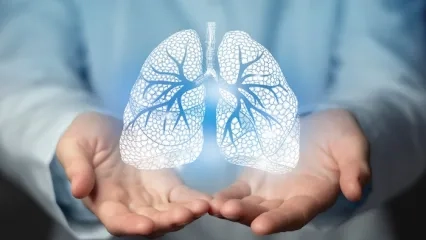Alo Yeditepe
Alo Yeditepe
What is Allergy? What are Allergy Symptoms?
Yeditepe University Hospitals Chest Diseases Specialist Prof. Dr. Banu Musaffa Salepçi: “It is not possible to completely eliminate the spring allergy. However, monitoring patients and controlling complaints prevents other diseases from being triggered. "Spring months bring along allergic problems. Especially pollen allergy causes significant complaints until the summer months. Chest Diseases Specialist Prof. Dr. Banu Musaffa Salepçi stated that although there is no definitive cure for allergy, it must be taken under control against some health problems and made the following statements on the subject:
What is Allergy?
Allergy is a chain of reactions that occurs in the human body as a result of the formation of an antibody called IgE in the first encounter against many substances such as house dust mites, pollen, some foodstuffs, cat-dog hair, fungal spores, and then the release of many chemicals in some organs through the IgE-allergen complex when these allergens are encountered again.
What are Allergy Symptoms?
The organs most affected by allergies are the nose, eyes, lungs, and skin. Seasonal allergies are usually manifested by itching in the nose, frequent sneezing, redness (conjunctivitis) in the eyes, itching and swelling.
Is There a Season for Allergies?
As some allergens can occur seasonally, some allergens can be seen year-round. In addition, the fact that the weather starts to warm up earlier with global warming and the seasons, especially the spring, may increase the exposure to pollen. Allergens such as house dust cause year-round allergies, while tree pollen also occurs in the spring, causing seasonal allergies. In spring allergies due to pollen, patients experience sneezing, itching in the nose and throat, nasal congestion, and runny nose, especially when they wake up in the morning. Out of season, these complaints are usually not seen.
How to Distinguish Allergies from Upper Respiratory İnfections?
Symptoms at the beginning of upper respiratory tract diseases and allergy symptoms may show similar characteristics. However, if the person knows that he/she has an allergy, he/she will be able to distinguish it easily. One of the most important indicators of allergy is itching and frequent sneezing. While fever is usually seen in upper respiratory tract infections, fever is not seen in allergies.
Who is At Risk of Allergies?
Those with a family history of allergies are always at high risk. Recently, the frequency of allergies in children has increased significantly. Allergies, which are seen around 3-5 percent, increase to 10-15 percent. In other words, we know that almost all types of allergies have increased 2-3 times in the last 20 years. People who do not have allergy problems in childhood can often have allergy problems between the ages of 20-40.
What Precautions Can Be Taken for Allergies?
It may be protective to avoid known allergens as much as possible in the prevention of the disease, to start using antihistamines beforehand and to use masks if you are going to be in open areas such as picnics where pollen is intense. Since these people may also be allergic to cat-dog fur, it is not recommended to feed pets at home. If there is an allergy to house dust mites, it is recommended not to have carpets, books, furry toys in the bedroom, and not to wear clothes such as blankets and fleece. It is recommended to avoid foods that cause allergies in patients with food allergies (such as eggs, strawberries, peanuts, seafood).
When and How is Allergy Treated?
It is not possible to completely eliminate the disease, its treatment is aimed at eliminating complaints. In the treatment, drugs called antihistamines, which eliminate the effect of substances such as histamine secreted in the body through IgE when an allergen is encountered, are most frequently used. In addition, sprays containing cortisone applied inside the nose and eye drops with cortisone can be used for eye complaints. Vaccine treatments to make the body insensitive to the allergen can also be applied to selected patients whose complaints cannot be controlled with these treatments, and who repeat very frequently." If the allergy is not treated, it can lead to allergic asthma and respiratory problems. If it is not also checked in asthmatic patients, severe attacks that may cause emergency department admission or even intensive care hospitalization may sometimes occur. Hence, it is very important to have close follow-up and complaints under control by a chest diseases physician in the treatment of asthma. In addition, depending on the type of allergen, swelling, itching, and swelling of the skin can often be seen. These problems can also be fully controlled with follow-up and treatment, but they do not completely disappear. Therefore, protective measures should also be taken.
Press Coverage: sozcu
About
Faculty and Year of Graduation:
İstanbul University, Çapa Faculty of Medicine, 1984
”
See Also
- What is Tuberculosis (TB)? Symptoms and Treatment
- Circadian Rhythm Disorder
- What is Good for Cough? How to Cure Cough?
- What Should Asthma Patients Be Cautious About?
- Does Poor Quality Sleep Increase The Risk of Asthma?
- COPD Makes You Age Early
- It Is Aimed to Eliminate Tuberculosis Worldwide By 2030
- Pollen is Now Seen Outside of Seasonal Changes
- Do Dental Caries Increase the Risk of Pneumonia?
- Smoking Rates Under the Age of 15 Are Increasing
- Inhaling Electronic Cigarettes for a Few Minutes Causes Damage to Vein Wall
- People Who Smoke More Than 25 Cigarettes a Day Have a 50-fold Increased Risk of Lung Cancer
- Can Back Pain Be A Sign of Lung Cancer?
- Nine Out of Ten COPD Patients Do Not Know They Are Sick
- Quitting Smoking Even After Diagnosing Lung Cancer Effects Lifespan
- Electronic Cigarettes Can Cause Heart Attacks!
- Pollen Allergy Has No Season
- Beware of Little-Known Risks of Smoking!
- Lung Cancer
- Does the Pneumonia Vaccine Protect Against the Coronavirus?
- In Case You Are Unable To Sleep Even If You Are Tired, Your Circadian Rhythm May Be Disrupted
Alo Yeditepe




